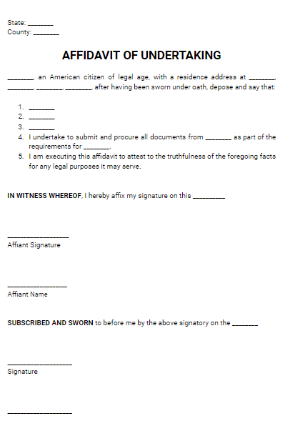- Eviction Notice Forms
- Power of Attorney Forms Forms
- Bill of Sale (Purchase Agreement) Forms
- Lease Agreement Forms
- Rental Application Forms
- Living Will Forms Forms
- Recommendation Letters Forms
- Resignation Letters Forms
- Release of Liability Agreement Forms
- Promissory Note Forms
- LLC Operating Agreement Forms
- Deed of Sale Forms
- Consent Form Forms
- Support Affidavit Forms
- Paternity Affidavit Forms
- Marital Affidavit Forms
- Financial Affidavit Forms
- Residential Affidavit Forms
- Affidavit of Identity Forms
- Affidavit of Title Forms
- Employment Affidavit Forms
- Affidavit of Loss Forms
- Gift Affidavit Forms
- Small Estate Affidavit Forms
- Service Affidavit Forms
- Heirship Affidavit Forms
- Survivorship Affidavit Forms
- Desistance Affidavit Forms
- Discrepancy Affidavit Forms
- Career Assessment - 16+ Examples, Format, Tips, Pdf Forms
- Undertaking Affidavit Forms
- General Affidavit Forms
- Affidavit of Death Forms
Undertaking Affidavit
In life, we often find ourselves in sticky situations that could affect our future or that of our loved ones. In a divorce settlement, for instance, the separation may also entail the release of your former partner from the mortgage that you once shared. While the good news is that you get to keep the house, the bad news is that you are now obligated to assume financial responsibility. In situations like this, an Undertaking Affidavit will allow you to guarantee the other party’s release by a specific time and give you the opportunity to prepare for such responsibility without your ex-spouse nagging about finalizing the release. Read More

By Type
In life, we often find ourselves in sticky situations that could affect our future or that of our loved ones. In a divorce settlement, for instance, the separation may also entail the release of your former partner from the mortgage that you once shared. While the good news is that you get to keep the house, the bad news is that you are now obligated to assume financial responsibility. In situations like this, an Undertaking Affidavit will allow you to guarantee the other party’s release by a specific time and give you the opportunity to prepare for such responsibility without your ex-spouse nagging about finalizing the release.
What Is an Undertaking Affidavit?
An Undertaking Affidavit provides assurance from one party to another to furnish specific information or fulfill certain obligations. It contains the affiant’s or declarant’s legal promise to do or not do something. This affidavit is considerably common in business settings in which a party agrees to carry out a particular deed in exchange for monetary or any form of compensation. Undertakings also play a significant role in family law cases where the overall welfare of a child is at stake. As for financial matters in a divorce or child settlement case, parents or ex-spouses who do not have the financial capacity to consistently provide child or spousal support can use the affidavit for reassurance to the other party.
How Do I Write an Undertaking Affidavit?
Anyone can write an affidavit. You can still get it right despite being your first time. Whether you use a template online or a form provided by the court or appropriate agencies, affidavits generally follow a similar outline that’s easy enough for anyone to familiarize. Listed below are a few guidelines to keep in mind when drafting an undertaking affidavit.
Know your purpose
Not everyone fully understands the implications of entering an undertaking. Before you start filing the affidavit, know that it’s often impossible to take back what you promised once everything has been set. It’s important to know what your intentions are and to consider the consequences that may arise as a result of your failure to meet these obligations. You have to be aware of how the undertaking may affect both your present and your future.
Cover what’s important
The affidavit must contain the affiant’s personal details and, if necessary, identifying information about the parties involved. As the person writing the affidavit, you also need to specify your intent and provide supplementary information to further expound your purpose.
Include a sworn statement
Conclude your affidavit with words of affirmation. You need to explicitly state that you agree to the terms of the undertaking and acknowledge the truthfulness and accuracy of these facts. It’s a good idea to keep this statement as short and simple as possible.
Sign and notarize
Before you affix your signature, make sure you do so in the presence of a notary public. Some states would also require the acknowledgment of a disinterested witness for further verification. Note that the affidavit will only be admissible in court if the signature of the appropriate parties are present.
FAQs
When do I file an affidavit?
Affidavits are simply a court testimony in writing. It can be a useful instrument when you process applications, respond to court directives, or address disputes with an adverse party. Apart from judicial proceedings, an affidavit can also be essential in restating title transfers, claiming assets, granting temporary guardianship, and other everyday scenarios where sworn declaration is necessary to pursue an action.
Can I withdraw my affidavit?
If you discover a mistake in your affidavit or find out the actual truth about an event after the affidavit has been filed, you still have the chance to amend or withdraw your affidavit before the start of a case hearing. However, there’s a statutory time period that may prevent you from making the withdrawal. These statutes vary on a case to case basis or may not apply to your situation. The best you can do is to review your state laws or consult the appropriate agencies for guidance.
Can I handwrite an affidavit?
Because an affidavit only functions as a supporting document, having it handwritten or typed is not something you have to worry about too much. While the decision between a handwritten and typed document lies on your preference and convenience, it’s important to consider the purpose of the affidavit to decide which approach would be more appropriate. When dealing with civil and criminal cases, typed and printed affidavits are more favorable for formality’s sake.
What does a “notarized” affidavit mean?
Signing an affidavit in the presence of a disinterested witness instead of a notary public is often acceptable. But there are circumstances and state laws that require affidavits to be notarized for them to be admissible in court. This means that an affiant must only sign the document in the presence of a notary public. The notary public is responsible for verifying the identity of the affiant and making sure that the facts enclosed in the affidavit are true.
What happens if I lie in an affidavit?
Perjury is a federal crime that could result in legal or financial consequences. Punishments include probation, hefty fines, and even jail time. Lying under oath is not something you want to catch yourself doing, not even if the lie can work in your favor for the time being. It’s important to be truthful and accurate with the information you provide in the affidavit to avoid getting in trouble with the authorities. You’ll want to make sure you get your facts straight before completing the affidavit, as amending your claims or cancelling its execution will only lead to more problems for the parties involved.
A verbal promise is easy to break without sufficient evidence to prove its existence. Thus, making a sworn statement to specify what you intend to do in a settlement is important in providing affirmation to perform the act. While an affidavit of undertaking may seem like the perfect solution to your problems, be wary of the consequences and liabilities. It’s always best to seek assistance from a legal expert to decide how you can move forward.
